The Psychology Of Swimming: Why Being In Water Makes Us Happy
There’s something undeniably special about being in water. Whether it’s taking a refreshing dip in the ocean, gliding across a lake, or swimming in a pool, the act of immersing ourselves in water seems to bring an immediate sense of relaxation and joy. At Barrier Reef Pools, we’re passionate about creating spaces that encourage these moments of happiness and well-being right at home. But what is it about water that makes us feel so good? Let’s dive into the psychology of swimming to understand why water is so powerful for our minds, bodies, and overall happiness.
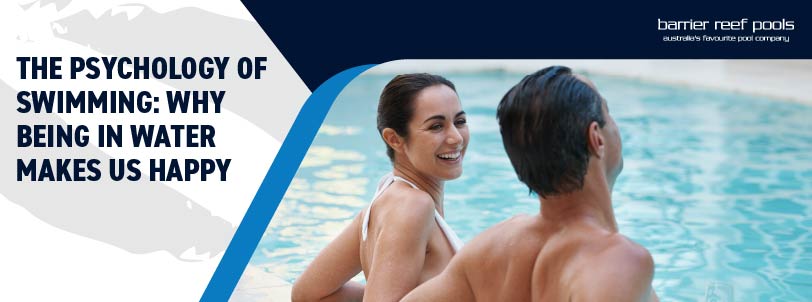
1. Water as a Natural Stress Reliever
Swimming is often associated with relaxation, and this isn’t just anecdotal. Research shows that water has a calming effect on the brain. When we’re submerged, our bodies naturally shift into a state of relaxation, reducing the levels of cortisol (the stress hormone) and promoting a sense of calm. The weightless sensation in water also alleviates pressure on our muscles and joints, helping our bodies physically relax and increasing feelings of tranquillity.
- The “Blue Mind Effect”: Marine biologist Dr. Wallace J. Nichols coined the term “Blue Mind” to describe the meditative state we experience when near, in, or under water. The colour blue itself is soothing, and the rhythmic sounds of water create a mental escape from daily stress, enhancing relaxation.
- Sensory Reduction and Mindfulness: When we’re in water, sensory input changes—sounds are muted, movements feel fluid, and our body experiences a gentle, all-encompassing touch. This environment encourages a mindful state, where we can focus on our breathing and become more present in the moment.
2. Boosting Mental Health and Mood
Swimming doesn’t just relax us—it’s also known to boost mood and improve mental health. Studies show that physical activity like swimming stimulates the release of endorphins, the body’s natural “feel-good” chemicals. Regular swimming has even been linked to reduced symptoms of anxiety and depression, making it an excellent choice for managing mental health.
- Releasing Endorphins: When we exercise, our brains release endorphins, which interact with receptors to reduce pain and improve mood. Swimming offers a low-impact way to increase these endorphins, giving us a natural mood boost without putting strain on our bodies.
- Promoting Serotonin Production: Exposure to natural light and fresh air during outdoor swimming also aids in the production of serotonin, the neurotransmitter associated with happiness and well-being. The combination of sun and water can significantly improve mood and energy levels, even after just a short swim.

3. The Social Aspect of Swimming
One of the joys of having a fibreglass pool is that it creates a natural gathering spot for family and friends. Social connections are essential for our mental health, and a pool provides a fun, relaxed environment to foster these bonds. Whether it’s a casual swim with friends or a family pool day, socialising around water can enhance feelings of connection and boost overall happiness.
- Building Bonds Through Shared Experiences: Swimming with others creates shared memories and experiences, reinforcing relationships and providing a positive mental boost. Even simply sitting poolside together can strengthen connections and create an environment for open conversations and laughter.
- Group Activities and Games: Pools make it easy to play and be active with others. From volleyball and pool games to group aerobics, the pool offers activities that encourage bonding, laughter, and a sense of togetherness—all of which contribute to happiness.
4. Swimming as a Form of Meditation
Many people find that swimming has a meditative quality. The rhythmic movement, steady breathing, and repetitive strokes can help clear the mind and create a sense of inner calm. This kind of meditative swimming encourages mindfulness, allowing us to tune into our body’s movements and sensations while letting go of stressful thoughts.
- Focused Breathing: Swimming requires us to control our breathing in sync with our movements, which has a similar effect to controlled breathing techniques used in meditation. This brings us into a relaxed state and helps slow down racing thoughts.
- Repetitive Motion and Flow State: Repetitive motions involved in swimming can help the brain reach a “flow state” where focus and enjoyment increase, and we lose track of time. Being in a flow state promotes happiness and can serve as a break from routine thoughts and stresses.
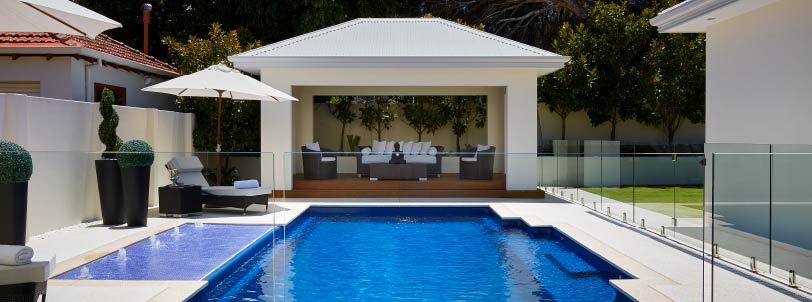
5. The Physical Benefits of Swimming and Its Impact on Happiness
Swimming is one of the best low-impact exercises we can do, benefiting both cardiovascular health and muscle strength without placing too much stress on the body. Regular exercise has been shown to improve mood and energy levels, contributing to a happier, healthier life. In addition to physical health benefits, the act of moving through water feels freeing and fun, enhancing overall enjoyment and well-being.
- Improved Physical Health and Self-Esteem: Exercising in water increases cardiovascular fitness, muscle tone, and flexibility. As people feel fitter and more capable, they often experience an increase in self-esteem and overall satisfaction with life.
- Enhanced Sleep Quality: Physical activity, especially when done in the calming environment of a pool, often leads to better sleep. Good quality sleep is essential for mood regulation and mental clarity, helping us feel more positive and energised.
6. Bringing the Benefits of Swimming to Your Backyard Pool
Creating an inviting, tranquil space around your pool can make it even easier to enjoy these psychological benefits regularly. Adding a few simple touches can turn your pool into a haven for relaxation, wellness, and connection.
- Incorporate Natural Elements: Plants, stones, and water features add to the calming ambiance of your pool area. These natural elements reinforce the connection to nature, enhancing the sense of peace and relaxation.
- Lighting for Evening Relaxation: Soft lighting around the pool, such as underwater LED lights or strategically placed lanterns, can create a magical nighttime environment. This allows for relaxing evening swims, extending the enjoyment of your pool beyond daylight hours.
- Comfortable Poolside Seating: Create a space where you can relax both in and out of the water. Comfortable lounge chairs, shaded areas, and inviting poolside seating can help you unwind and enjoy your pool even when you’re not swimming.
A pool isn’t just a place to cool off—it’s a source of joy, relaxation, and well-being. At Barrier Reef Pools, we believe in creating pools that enhance quality of life by giving families and individuals a place to unwind, stay active, and find happiness in the simple pleasures of being in water. Whether you’re a casual swimmer or an avid water enthusiast, your pool can become a sanctuary that brings relaxation, connection, and endless happiness to your life.
The Psychology Of Swimming: Why Being In Water Makes Us Happy
There’s something undeniably special about being in water. Whether it’s taking a refreshing dip in the ocean, gliding across a lake, or swimming in a pool, the act of immersing ourselves in water seems to bring an immediate sense of relaxation and joy. At Barrier Reef Pools, we’re passionate about creating spaces that encourage these moments of happiness and well-being right at home. But what is it about water that makes us feel so good? Let’s dive into the psychology of swimming to understand why water is so powerful for our minds, bodies, and overall happiness.
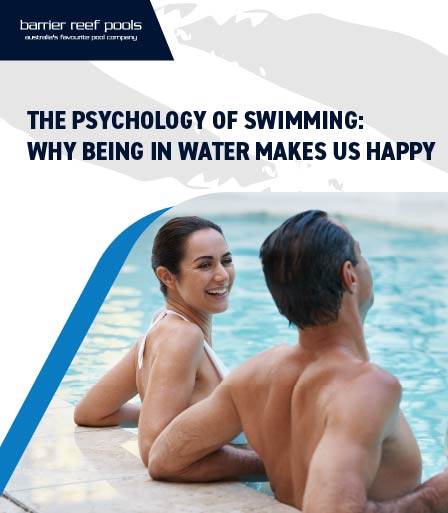
1. Water as a Natural Stress Reliever
Swimming is often associated with relaxation, and this isn’t just anecdotal. Research shows that water has a calming effect on the brain. When we’re submerged, our bodies naturally shift into a state of relaxation, reducing the levels of cortisol (the stress hormone) and promoting a sense of calm. The weightless sensation in water also alleviates pressure on our muscles and joints, helping our bodies physically relax and increasing feelings of tranquillity.
- The “Blue Mind Effect”: Marine biologist Dr. Wallace J. Nichols coined the term “Blue Mind” to describe the meditative state we experience when near, in, or under water. The colour blue itself is soothing, and the rhythmic sounds of water create a mental escape from daily stress, enhancing relaxation.
- Sensory Reduction and Mindfulness: When we’re in water, sensory input changes—sounds are muted, movements feel fluid, and our body experiences a gentle, all-encompassing touch. This environment encourages a mindful state, where we can focus on our breathing and become more present in the moment.
2. Boosting Mental Health and Mood
Swimming doesn’t just relax us—it’s also known to boost mood and improve mental health. Studies show that physical activity like swimming stimulates the release of endorphins, the body’s natural “feel-good” chemicals. Regular swimming has even been linked to reduced symptoms of anxiety and depression, making it an excellent choice for managing mental health.
- Releasing Endorphins: When we exercise, our brains release endorphins, which interact with receptors to reduce pain and improve mood. Swimming offers a low-impact way to increase these endorphins, giving us a natural mood boost without putting strain on our bodies.
- Promoting Serotonin Production: Exposure to natural light and fresh air during outdoor swimming also aids in the production of serotonin, the neurotransmitter associated with happiness and well-being. The combination of sun and water can significantly improve mood and energy levels, even after just a short swim.
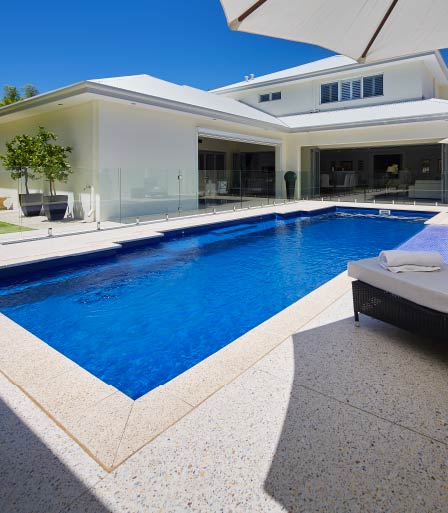
3. The Social Aspect of Swimming
One of the joys of having a fibreglass pool is that it creates a natural gathering spot for family and friends. Social connections are essential for our mental health, and a pool provides a fun, relaxed environment to foster these bonds. Whether it’s a casual swim with friends or a family pool day, socialising around water can enhance feelings of connection and boost overall happiness.
- Building Bonds Through Shared Experiences: Swimming with others creates shared memories and experiences, reinforcing relationships and providing a positive mental boost. Even simply sitting poolside together can strengthen connections and create an environment for open conversations and laughter.
- Group Activities and Games: Pools make it easy to play and be active with others. From volleyball and pool games to group aerobics, the pool offers activities that encourage bonding, laughter, and a sense of togetherness—all of which contribute to happiness.
4. Swimming as a Form of Meditation
Many people find that swimming has a meditative quality. The rhythmic movement, steady breathing, and repetitive strokes can help clear the mind and create a sense of inner calm. This kind of meditative swimming encourages mindfulness, allowing us to tune into our body’s movements and sensations while letting go of stressful thoughts.
- Focused Breathing: Swimming requires us to control our breathing in sync with our movements, which has a similar effect to controlled breathing techniques used in meditation. This brings us into a relaxed state and helps slow down racing thoughts.
- Repetitive Motion and Flow State: Repetitive motions involved in swimming can help the brain reach a “flow state” where focus and enjoyment increase, and we lose track of time. Being in a flow state promotes happiness and can serve as a break from routine thoughts and stresses.
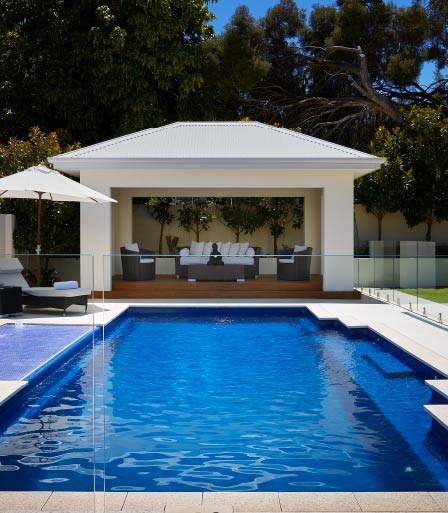
5. The Physical Benefits of Swimming and Its Impact on Happiness
Swimming is one of the best low-impact exercises we can do, benefiting both cardiovascular health and muscle strength without placing too much stress on the body. Regular exercise has been shown to improve mood and energy levels, contributing to a happier, healthier life. In addition to physical health benefits, the act of moving through water feels freeing and fun, enhancing overall enjoyment and well-being.
- Improved Physical Health and Self-Esteem: Exercising in water increases cardiovascular fitness, muscle tone, and flexibility. As people feel fitter and more capable, they often experience an increase in self-esteem and overall satisfaction with life.
- Enhanced Sleep Quality: Physical activity, especially when done in the calming environment of a pool, often leads to better sleep. Good quality sleep is essential for mood regulation and mental clarity, helping us feel more positive and energised.
6. Bringing the Benefits of Swimming to Your Backyard Pool
Creating an inviting, tranquil space around your pool can make it even easier to enjoy these psychological benefits regularly. Adding a few simple touches can turn your pool into a haven for relaxation, wellness, and connection.
- Incorporate Natural Elements: Plants, stones, and water features add to the calming ambiance of your pool area. These natural elements reinforce the connection to nature, enhancing the sense of peace and relaxation.
- Lighting for Evening Relaxation: Soft lighting around the pool, such as underwater LED lights or strategically placed lanterns, can create a magical nighttime environment. This allows for relaxing evening swims, extending the enjoyment of your pool beyond daylight hours.
- Comfortable Poolside Seating: Create a space where you can relax both in and out of the water. Comfortable lounge chairs, shaded areas, and inviting poolside seating can help you unwind and enjoy your pool even when you’re not swimming.
A pool isn’t just a place to cool off—it’s a source of joy, relaxation, and well-being. At Barrier Reef Pools, we believe in creating pools that enhance quality of life by giving families and individuals a place to unwind, stay active, and find happiness in the simple pleasures of being in water. Whether you’re a casual swimmer or an avid water enthusiast, your pool can become a sanctuary that brings relaxation, connection, and endless happiness to your life.



